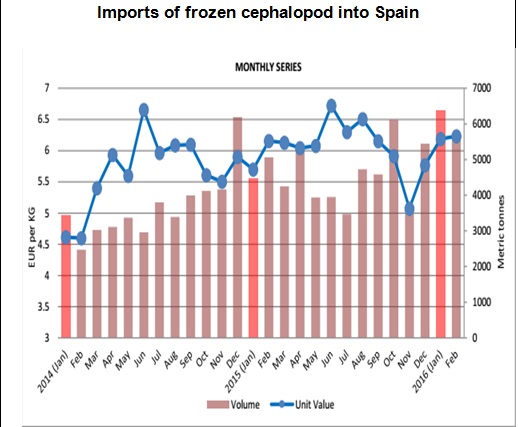(seafood.vasep.com.vn) According to the statistics of Vietnam Customs, in May 2016, Vietnam’s cephalopod exports hit US$30.38 million, down 16.8% compared to May 2015. The figure in Jan-May 2016 estimated at US$142.48 million, down 10.6% from the same period in 2015.
In May 2016, top 5 cephalopod importing markets from Vietnam reduced imports of this item. In which, China and Hong Kong, with the import value of US$1.1 million, posted the sharpest fall of 33% compared to the same period in 2015. In Jan-May 2016, cephalopod sales to this market reached US$4.95 million, down nearly 46% over the same period of 2015.
South Korea stayed as the largest cephalopod importer from Vietnam with the proportion of 38.2%. In May 2016, the shipments to the market hit US$11.01 million, down 19.5%; the figure in Jan-May 2016 was US$54.37 million, down 14.8% from the same period in 2015.
Out of top 9 leading cephalopod importers of Vietnam, Taiwan and Australia registered the positive growth. The exports to Taiwan in Jan-May 2016 totaled US$2.01 million, up 5.5% year on year. Meanwhile, in May 2016, the shipments to Australia with the sales of US$275 thousand reported the highest increase of 39%; the figure in the first 5 months of 2016 estimated at US$1.62 million, up 50% over the same period last year.
Among total cephalopod exports, exports of squid took the larger proportion of 53.3% with the value of US$75.98 million in Jan-May 2016.
So far, Japan was the biggest squid importer from Vietnam, followed by South Korea and Thailand, while South Korea is a leading octopus importer from Vietnam, followed by Japan and Italy.
Currently, the price of squid in the global market increased by 30% due to El Nino. In general, squid catches were reported to reduce significantly in the winter and spring. In which, Japan, Argentina, the Falklands, Chile and California showed the sharp drop caused by the direct impact from El Nino in 2015-2016.
However, as reported by The National Oceanic and Atmospheric Administration (NOAA) in Mar 2016, the strong El Nino effect in 2015-2016 has been declining and it was expected to disappear in the early summer. Because squid had the reaction to the change of water temperature, their reproductive cycle was relatively short and so squid catches were expected to rise again with normal water temperatures.
Meanwhile, the price of squid posted its record high due to the shortage of the global supply. Currently, the squid tubes and tentacles size 3-5 inches from China increased by 17.5% since early this year and up 30% over the same period last year. Despite such high price, demand for this product remains strong and buyers considered it as a valuable protein source with attractive price.
Written by Ngoc Thuy
Compiled by Dieu Thuy